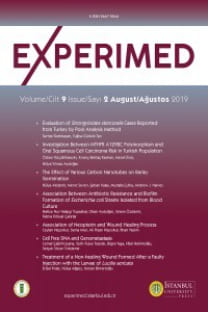CD247 Genine Ait rs858554 ve rs704848 Polimorfizmlerinin İmmün Trombositopeni Hastalığı ile İlişkisi
İTP, otoimmünite, immün sistem, trombosit, CD247, polimorfizm
The association of CD247 Gene rs858554 and rs704848 Polymorphisms with Immune Thrombocytopenia Disease
ITP, autoimmunity, immune system, platelet, CD247, polymorphism,
___
- 1. Bylsma LC, Fryzek JP, Cetin K, Callaghan F, Bezold C, Mehta B, Wasser JS. Systematicliteraturereview of treatments used for adult immune thrombocytopenia in the second-linesetting. Am J Hematol 2019; 94: 118-32. 2. Neunert CE, Cooper N. Evidence-based management of immune thrombocytopenia: ASH guideline update. Hematology Am Soc Hematol Educ Program 2018; 2018: 568-75. 3. Audia S, Mahévas M, Samson M, Godeau B, Bonnotte B. Pathogenesis of immunethrombocytopenia. Autoimmun Rev 2017; 16: 620-32. 4. Rodeghiero F, Stasi R, Gernsheimer T, Michel M, Provan D, Arnold DM, et al. Standardization of terminology, definitions and outcome criteria in immune thrombocytopenic purpura of adults and children: report from an international working group. Blood 2009; 113: 2386-93. 5. Neunert C, Lim W, Crowther M, Cohen A, Solberg L Jr, Crowther MA, American Society of Hematology. 2011 evidence-based practice guideline for immune thrombocytopenia. Blood 2011; 117: 4190-207. 6. Stasi R, Newland AC. ITP: a historical perspective. J Hematol 2011; 153: 437-50. 7. İTP Tanı ve Tedavi Kılavuzu. Türk Hematoloji Derneği, 2011. 8. Grainger JD, Bolton-Maggs PHB, Godeau B, Bussel J, Donato H, Elalfy M, et al. Diagnosis and management of chronic ITP: comments from an ICIS expert group. Ann Hematol 2010; 89: 11-7. 9. Blanchette M, Freedman J. The history of idiopathic thrombocytopenic purpura (ITP). Transfus Sci 1998; 19: 231-6. 10. McMillan R, Luiken GA, Levy R, Yelenosky R, Longmire RL. Antibody against megakaryocytes in idiopathic thrombocytopenic purpura. JAMA 1978; 239: 2460-2. 11. Abbas AK, Lichtman AH. (2nd ed.). (2004). Basic immunology: functions and disorders of the immune system. Phiadelphia, W.B Saunders Co. 12. Ngoenkam J, Schamel WW, Pongcharoen S. Selected signalling proteins recruited to the T-cell receptor-CD3 complex. Immunology 2018; 153: 42-50. 13. Ahonen T, Saltevo J, Laakso M, Kautiainen H, Kumpusalo E, Vanhala M. Gender differences relating to metabolic syndrome and proinflammation in Finnish subjects with elevated blood pressure. Mediators Inflamm 2009; 2009: 959281. 14. Degner JF, Pai AA, Pique-Regi R, Veyrieras JB, Gaffney DJ, Pickrell JK, et al. DNase I sensitivity QTLs are a majör determinant of human expression variation. Nature 2012; 482: 390-4. 15. Trynka G, Sandor C, Han B, Xu H, Stranger BE, Liu XS, et al. Chromatin marks identify critical cell types for fine mapping complex trait variants. Nature Genetics 2013; 45: 124-30. 16. Zhang CM, Yu LY, Lv JF, Gong L, Zhou HH, Chen XP, et al. Effects of immuno-related gene polymorphisms on a bispecific antibody targeting colorectal cancer cell. Per Med 2018 15: 167-79. 17. Li P, Wang X, Zhao MQ, Li LJ, Zhang C, Li BZ, et al. TCR-CD3ζ gene polymorphisms and expression profile in rheumatoid arthritis. Autoimmunity 2016; 49: 466-71. 18. Martins M, Williams AH, Comeau M, Marion M, Ziegler JT, Freedman BI, et al. Genetic association of CD247 (CD3ζ) with SLE in a large-scale multiethnic study. Genes Immun 2015; 16: 142-50.
- Yayın Aralığı: Yılda 3 Sayı
- Başlangıç: 2011
- Yayıncı: İstanbul Üniversitesi
Osteointegre Dental İmplant Tedavisi Gören Hastalarda IL-1 β Genotipi ve Seviyelerinin İncelenmesi
Ferhat DİZEN, Uzay GÖRMÜŞ, Arzu ERGEN, Meral ÜNÜR, Elif Sinem İPLİK, Bedia ÇAKMAKOĞLU, Turgay İSBİR
Resul KAHRAMAN, Veysel HANCER, Arzu ERGEN, Bedia ÇAKMAKOĞLU, Reyhan DİZ KÜÇÜKKAYA
İki Tilmikosin Preparatının Koyunlarda Biyoeşdeğerliği
CD247 Genine Ait rs858554 ve rs704848 Polimorfizmlerinin İmmün Trombositopeni Hastalığı ile İlişkisi
İbrahim KUTLUBAY, Elif Gülsüm ÜMİT, Jülide TOZKIR
Elif ŞAHİN, Nurten DAYIOĞLU, Baransel ÖKMEN, Ezgi KORKMAZ, Şevval BAYKARA, Gül BAKTIR
Fatma KÖKSAL ÇAKIRLAR, Sevilay YILDIZ, Okan AYDOĞAN, Sinem ÖZDEMİR, Sercan AKYOL ÇOLAKOĞLU, Zeynep TANER, Halit TOKMAN, Nevriye GÖNÜLLÜ
Evde Bakım Hastalarının Laboratuvar Özellikleri
Zeynep KARAALİ, Beste TACAL ASLAN, Mehmet Burak AKTUĞLU, Macit KOLDAŞ, Elif Sinem İPLİK, Bedia ÇAKMAKOĞLU
